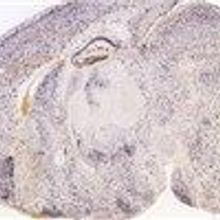Login
Subscribehypothalamus, neuroscience

How the Brain Hits the Brakes on Aging
Aparna Nathan, PhD | Mar 18, 2024 | 4 min read
Neurons linked to metabolic processes slow aging in mice.

Mouse Brain Cells Activate When They Witness a Fight
Mariella Bodemeier Loayza Careaga, PhD | Jun 1, 2023 | 2 min read
A subset of hypothalamic neurons mirrors aggression in mice, challenging previous views on the location and functional role of these cells.

Methylation in Young Brains May Be Key to Obesity: Mouse Study
Alejandra Manjarrez, PhD | Oct 19, 2022 | 4 min read
Epigenetic events, such as methylation, during early brain development in mice occur in genomic regions associated with BMI in humans, according to a new study.

Specialized Brain Circuit Makes Mice Itchy When They See Others Scratch
Dan Robitzski | Oct 12, 2022 | 4 min read
A previously undetected pathway in the mouse brain bypasses the visual cortex to directly activate contagious itch.

Mother’s Circadian Rhythms Mirrored in Fetal Rat Brains
Bianca Nogrady | Sep 12, 2022 | 2 min read
Before their own central clocks develop, the brains of fetal rats detect their mother’s metabolic cycle to help regulate the expression of certain genes.

Discovered: Brain Cells that Control Hibernation-Like States
Ruth Williams | Jun 11, 2020 | 3 min read
Two independent teams identify neuron populations in the mouse brain that regulate the physiological changes associated with torpor.

Early Epigenetic Changes Regulate Voluntary Exercise in Mice: Study
Emma Yasinski | Dec 7, 2019 | 3 min read
Altering DNA methylation in a particular area of the hypothalamus halved the animals’ voluntary exercise as adults.

Exercise Warms the Brain, Causing Mice to Eat Less
Kerry Grens | Apr 24, 2018 | 1 min read
Directly activating a heat sensor also sensitive to capsaicin in chili peppers in the hypothalamus had the same effect as exercise.

Infographic: Searching for the Neural Basis of Gender
Shawna Williams | Feb 28, 2018 | 1 min read
Brain studies have yielded a mixed picture of the neural similarities and differences between people of different genders.

Stem Cells in the Hypothalamus Slow Aging in Mice
Ashley P. Taylor | Jul 26, 2017 | 4 min read
Once implanted into animals’ brains, neural stem cells that secrete microRNA-containing vesicles seem to contribute to an anti-aging effect.

Binge-Eating Neurons Identified
Jef Akst | May 26, 2017 | 1 min read
Inducing activity in the zona incerta region of the brain prompts mice to gorge themselves.

Neuroscience of Marijuana Munchies
Ruth Williams | Feb 18, 2015 | 3 min read
Cannabinoids cause appetite-suppressing neurons to produce an appetite-stimulating hormone in mice.
Sex, Deconstructed
Megan Scudellari | Feb 2, 2012 | 3 min read
Hormones in the brain control sex-specific behaviors by activating individual genetic programs.
